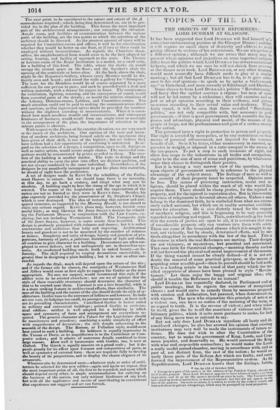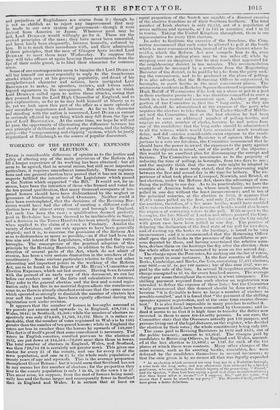TOPICS OF THE DAY.
THE OBJECTS OF TRUE REFORMERS :
LORD DURHAM AT GLASGOW.
IT has been suggested that Lord DURHAM will find himself lea somewhat embarrassing position at the Glasgow Dinner; and that it w ill require no small share of dexterity and address to avoid giving oflbrice to sections of his entertainers. We are altogether of a different opinion ; although we are aware that many may he present whose opinions and prejudices on some important subjects differ from the politics which Lord Dm-IX:II lies always maintained hitherto, and which we are sure he will not shrink from avowins at the dinner next week. Lord BROUGHAM, or any other trimmer, would most assuredly have difficult cards to play at a similar meeting; but all that Lord DURHAM has to do, is to give utter- ance to his real opinions—to speak as he spoke a twelvemonth ago* at Gateshead, and more recently at Edinburgh and Dundee.t Some choose to term Lord DURHAM'S politics "Revolutionary," and fancy that the epithet conveys a stigma : but men of sense will not be led astray by a nickname ; they will examine and re- ject or adopt opinions according to their evidence, and pursue measures according to their actual value and tendency. Illien fairly stated, it will be seen that these so-called " Revolution politics," are not only compatible with, but necessary to good government, —if that is good government, which consults the hap. piness and advantage, physical and moral, of the masses of the
people at large, not the predominance and gain of a section merely of the nation.
The governed have a right to protection in person and property. The right is invaded by monopolies, or by any restrictions on their means of personal advancement, not imposed for the cotnnion benefit of all. So is it by taxes, either unnecessary in amount, op. pressive in weight, or imposed in a ratio unequal to the means of the tax-payers. To put a stop to such invasions of right, and allow free scope to the industrious in all trades and occupations, ought to be the aim of men of sense and patriotism, by whatsoever name they choose to distinguish their politics.
But it is taking a very narrow view of the question, to look upon objects of government merely in reference to the physical advantage of the subject many. The feelings of men as well as the security of their property must be respected. Opinion must be free. The means of procuring instruction, moral and re- ligious, should be placed within the reach of all who would fain acquire them. There should be cheap justice, for the injured in property, and for the injured in reputation also. But in this country one class of religionists is favoured above all others. Unless a man belong to the dominant faith, he is excluded from what are errone- ously called national, but which are in reality sectarian establish. ments for education. He is also directly taxed for the support of another's religion, and this is beginning to be very generally regarded as insulting and unjust. Then, notwithstanding the boast that the courts of justice are open to all, it is notorious that men of considerable property only can venture into them with safety. These arc some of the recognized abuses which it is sought to up- root, not violently, but by steady, determined efforts, and by me- thods altogether in accordance with the law of the land. This is the course in which the real Reformers are moving. Their designs are not visionary, or mysterious, but practical and ascertained. They care little for theoretical changes,—meaning thereby suchas will not forward the physical and moral improvement of the masses. If the thing wanted cannot be clearly defined—if it is not evi- dently the removal of some practical grievance, or the means of acquiring some sensible good—then its pursuit should be laid aside. This is a leading article in the creed of that party which the ter- rified supporters of abuses have been pleased to style " Revolu- tionary." Let them enjoy the happy and original idea; why should it trouble the Reformers for an instant?
Lord DURHAM has repeatedly declared, in Parliament and at public meetings, that he regrets the existence of recognized abuses ; and would strive to remedy them by measures prepared with caution and deliberation, but pursued, when determined on, with vigour. The men who stigmatize this principle of action as a violent one, can have no notion of the meaning of the term, or no regard to truth. It is the reverse of violent ; and when taken by itself, gives the lie to all the assertions of violence and Revo- lutionary politics, which it suits mere partisans to wake, for lack of any thing more true or rational to say. But not only does. Lord DURHAM repudiate all hasty and ill- considered changes, he also has avowed his opinion that existing institutions may very well be made the instruments of future re- forms. He does not wish to alter the Constitution of the country, but to make the government of King, Lords, and Com- mons popular, and deservedly so. He would surround the King with wise and responsible counsellors; he would make the Lords a really useful second chamber, moving in accordance with, and as part of, not distinct from, the rest of the nation ; he would re- medy those parts of the Reform Act which are faulty, and carry forward the improvement of the Representative system. As for Republicanism, Lord DURHAM knows that the feelings, habits,
• On the 23d of October 1833.
Except in a part of his answer to the address of the Political Union, already nn ticed in this journal. here Lord Dv/tit/tat appears to have laboured under a prev tout impression. and in so far the answer involved an error in logic. The Unionists may have stood in need of instruction, or deserved reproof; but this did not appear nu the face of the address. On such occasions, it is wisest to abide by the written reconl, and turn a deaf ear to private whisperings, which may be prompted by local prejudices.
and prejudices of Englishmen are averse from it ; though he is net so- childish as to reject any improvement that may be made in our own system of government—though it were derived from America or Japan. Wherever good may be had, Lord DuRHAm would willingly go for it. These are the representative for ever 1235 electors. avowed principles of the man; they have never been concealed, will lay himself out most especially to reply to the treacherous straightforward character and actions, have instigated Lord BROUGHAM to make, in speeches, reviews, and letters under feigned signatures in the newspapers. But although we think from Lord DuitHAm called upon to notice these attacks, seeing that they proceed fm the Lord High Chancellor of England, and to
do, yet we look upon this part of the affair as a mere episode of very secondary importance and interest. As far as his character and standing with the nation is concerned, Lord DURHAM cannot be seriously affected by any thing which may fall from the lips or pen of Lord BROUGHAM. At the same time, we hope be will not let pass the opportunity of illustrating the difference between his own principle of deliberate and steady progression, and the halting policy—the "compromising and clipping " system, which he justly stigmatized at Edinburgh as the source of popular discontent.



















 Previous page
Previous page